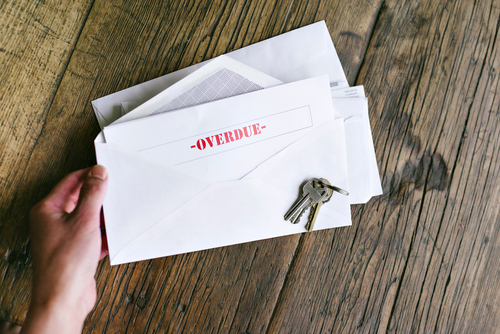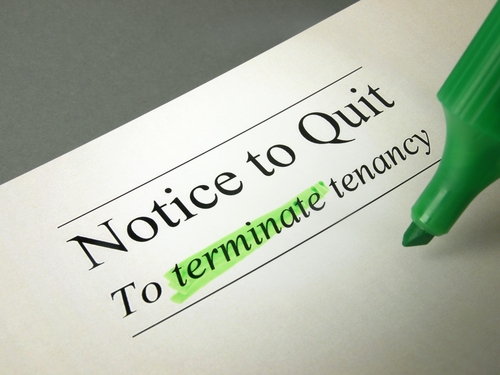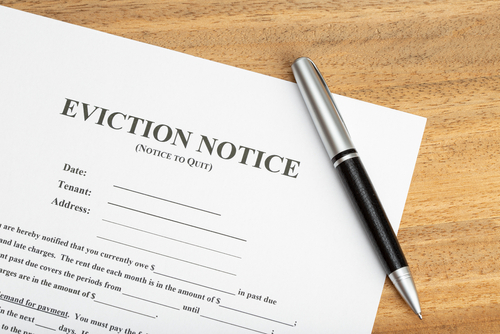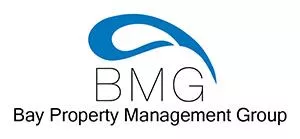When to Serve a Notice to Quit for Nonpayment of Rent
Being a landlord can be highly rewarding but equally challenging–especially when a tenant fails to pay rent on time. When tenants consistently fail to pay rent, it can affect a landlord’s ability to make money and pay the bills they need to pay. Today, we’ll review what you can do as a landlord or property manager in Fairfax when a tenant doesn’t pay their rent on time. Read along to learn more about how to file a Notice to Quit for nonpayment of rent.

Contents of This Article:
- When to File a Notice to Quit for Nonpayment
- What Is a Notice to Quit for Nonpayment of Rent?
- How to Write a Notice to Pay or Quit
- Steps in the Eviction Process in Northern Virginia
- Ensure Stress-Free Management With BMG
When to File a Statement to Quit for Nonpayment
It can be extremely frustrating when tenants don’t pay rent on time. However, you generally can’t serve them a Notice to Quit for nonpayment of rent the second it’s considered late. The timing for filing a Notice to Quit may depend on the laws and regulations in the specific jurisdiction where the property is located. It’s important for rental owners and property managers in Fairfax to understand the laws regarding late rent payments.

That said, here are some general guidelines to follow when a tenant doesn’t pay rent on time.
- Grace Period- Some jurisdictions require a grace period, giving tenants a certain number of days beyond the due date to pay rent. Some states may not have a required grace period, but many landlords give their tenants 3 to 5 days to make a payment.
- Late Rent Notice- If the tenant still hasn’t paid their rent within the grace period, landlords can send a Late Rent Notice. This isn’t the same as a Notice to Quit, but it gives the tenant an initial warning and reminder to pay the overdue amount as soon as possible.
- Notice to Quit- If the tenant fails to pay rent even after receiving a Late Rent Notice, landlords may proceed with a Notice to Quit for nonpayment of rent. This formally informs the tenant that they’ve violated the lease agreement and gives them a timeline to either pay the overdue amount or vacate the property.
What Is a Notice to Quit for Nonpayment of Rent?
A Notice to Quit for nonpayment of rent is a legal document used by landlords to inform tenants that they’re in violation of their lease agreement due to failure to pay rent. Here are a few of the different types of notices you may need to issue your tenants in Northern Virginia for failing to pay rent on time.
- Five-Day Notice to Pay Rent or Quit
- Thirty-Day Notice to Cure or Quit
- Thirty-Day Unconditional Quit Notice
Five-Day Notice to Pay Rent or Quit
If tenants are late with their rent, landlords can give them a five-day notice to pay rent or quit. This lets the tenant know that they have five days to either pay rent or move out of the rental. The landlord may initiate legal proceedings if they don’t comply within the specified timeframe.
Thirty-Day Notice to Cure or Quit
Sometimes, a landlord may issue a thirty-day notice to cure or quit. Generally, landlords issue this type of notice when a tenant violates the rental agreement, and that violation can be remedied. With this type of notice, the tenant has 30 days to remedy the nonpayment or other lease violations. If the tenant fails to do so within the specified timeframe, the landlord may proceed with eviction.
Thirty-Day Unconditional Quit Notice
If a tenant violates the lease agreement and the situation cannot be remedied, landlords may issue a thirty-day unconditional quit notice. This is often used when there are repeated lease violations, including failure to pay rent. The notice should specify the violation and inform the tenant that they must move within 30 days, or the landlord will file an eviction lawsuit against them.
How to Write a Notice to Pay or Quit
When serving tenants with any type of notice or paperwork, the information must be legally compliant, thorough, and straightforward. While each state differs in its requirements, most of the information in a Notice to Pay or Quit should include the following.
- Date of the Notice to Pay Rent or Quit
- Clear indication at the top of the notice that it’s a FIVE-DAY NOTICE TO QUIT FOR NONPAYMENT OF RENT (or however many days you’re required to give)

- A statement that the tenant has __ days to pay or quit
- Names of all tenants listed on the lease and their addresses
- Amount of rent due and which part of the lease was violated
- Notice that if the tenant doesn’t pay within the given number of days, you’ll be forced to bring an eviction case to court.
- Where the tenant can pay the past due rent
- Landlord’s signature
Steps in the Eviction Process in Northern Virginia
If you serve a Notice to Quit or pay rent and the tenant still refuses to pay, you may need to proceed with eviction. While it can be a lengthy and costly process that many landlords avoid, it may be the only way to recoup your losses. Here are some of the steps to follow for eviction if you own rentals in Northern Virginia.
- Notice to Quit or Pay Rent- Landlords can start eviction by serving a Notice to Quit or Pay Rent.
- Waiting Period- In Virginia, tenants usually have a five-day period to either pay the rent or move out after receiving the Notice to Quit.
- File a Summons for Unlawful Detainer- If tenants don’t comply with the notice within the given timeframe, landlords can file a Summons for Unlawful Detainer in the General District Court. This initiates the legal eviction process.

- Court Hearing- Both the landlord and tenant present their cases in court. If the court rules in favor of the landlord, it issues a judgment for possession.
- Writ of Possession- If the tenant still doesn’t move out after the court judgment, landlords can obtain a Writ of Possession from the court. This is then given to the sheriff, who carries out the eviction by physically removing the tenant and their belongings from the property.
- Tenant’s Possessions- In Virginia, the landlord must store the tenant’s possessions for at least ten days after the eviction, and tenants have the right to reclaim their belongings within this timeframe.
- Possession of the Property- The landlord regains possession of the property once the eviction process is complete.
Ensure Stress-Free Management With BMG
It’s extremely frustrating for landlords when tenants don’t pay rent on time. You have to track them down and remind them that rent is due, or if they continue to not pay, you may even send a Notice to Quit for nonpayment of rent. This process isn’t fun for anybody, especially landlords who have lost money and may need to find another tenant for their property. Luckily, with a reliable property management team by your side, you can stress less about things like collecting on-time payments or sending notices to tenants.
Bay Property Management Group offers comprehensive rental management services throughout Northern Virginia and surrounding areas. We can help communicate with tenants, send notices for late rent, and collect rent payments. If your tenants refuse to pay, leading you to evict them from your property, we can help with that, too. Contact us today to learn more about our property management services and how we can help your rental business succeed.



